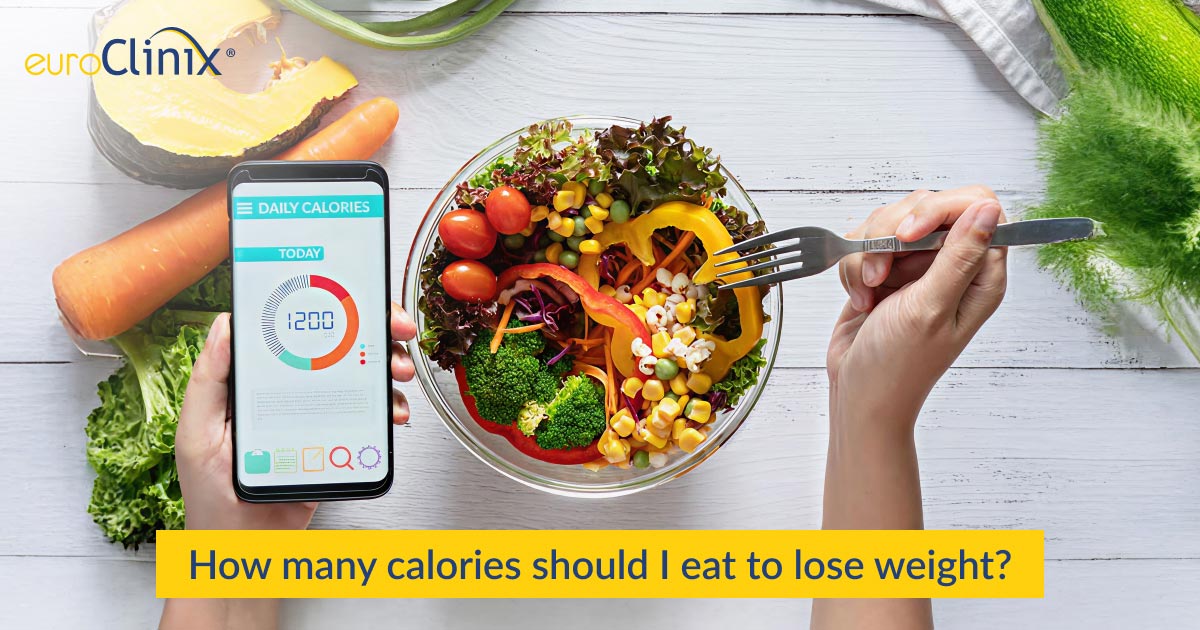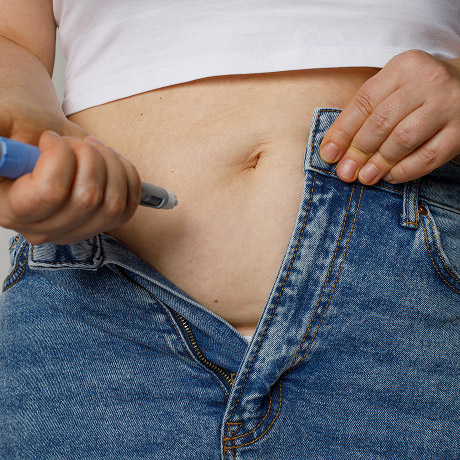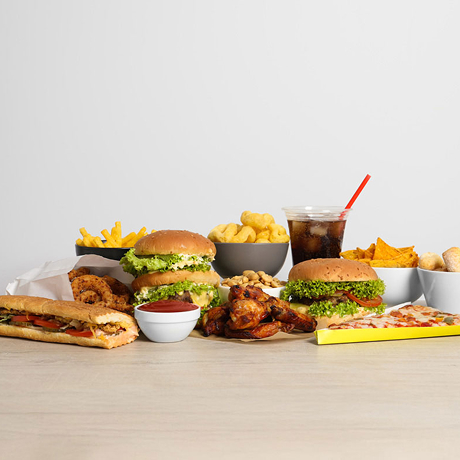Login to your account
- Prescription included
- Genuine medication
- All-inclusive service - No hidden fees
- Free next-day delivery
How many calories do I need to lose weight?
Figuring out how many calories you should be consuming each day is important, especially if you're trying to lose weight. However, your daily calorie intake depends on many different factors, including your age, gender, body composition, and activity level.
In this article, we’ll walk you through how to calculate your calorie needs using our free calorie calculator and explain how to set a sustainable calorie deficit. You can also download our free meal plan to help you get started.
Key takeaways
- Your calorie needs are personal and may change along your journey.
- Tools like our online calorie calculator and free downloadable 7-day meal plan are useful and make healthy choices easier.
- Speak to doctors or nutritionists for guidance to help you reach your weight loss goals.
How many calories should you eat to lose weight?
To lose weight, you need to consume fewer calories than you burn. This is called a calorie deficit. Typically, healthy weight loss occurs when you are in a deficit of around 500 calories per day, which can lead to 0.5-1 kg fat loss every week. However, the exact number can vary based on factors like your age, weight, activity level, and metabolism.
To figure out how many calories you should eat for weight loss, first you need to understand your Total Daily Energy Expenditure (TDEE), Basal Metabolic Rate (BMR), and your activity level.
- The amount of calories your body uses each day is known as your Total Daily Energy Expenditure (TDEE). This includes all the energy your body uses at rest, during digestion, and when exercising.
- Your Basal Metabolic Rate (BMR) is the number of calories your body needs to carry out basic functions at rest. This includes tasks such as breathing or regulating your body temperature.
- Your activity level is how much activity you do throughout the day. This includes exercising as well as other activities you perform as part of your job or usual daily activities.

The basic formula to remember is:
BMR + Activity level = TDEE
Calorie information is often given in kcals, or kilocalories. Below is a guide on how many calories an average person requires per day according to the Nutrition and Hydration Requirements In Children and Adults:
| Daily recommended calorie intake in adults (kcal) | |||||
|---|---|---|---|---|---|
| Age (years) | Male | Female | |||
| Sedentary | Active | Sedentary | Active | ||
| 16-18 | 2400 | 2800 | 1800 | 2000 | |
| 19-20 | 2600 | 2800 | 2000 | 2200 | |
| 21-25 | 2400 | 2800 | 2000 | 2200 | |
| 26-40 | 2400 | 2600 | 1800 | 2000 | |
| 41-45 | 2200 | 2600 | 1800 | 2000 | |
| 46-50 | 2200 | 2400 | 1800 | 2000 | |
| 51-60 | 2200 | 2400 | 1600 | 1800 | |
| 61-65 | 2000 | 2400 | 1600 | 1800 | |
| Daily recommended calorie intake in children (kcal) | |||||
|---|---|---|---|---|---|
| Age (years) | Male | Female | |||
| Sedentary | Active | Sedentary | Active | ||
| 2 | 1000 | 1000 | 1000 | 1000 | |
| 3 | 1000 | 1400 | 1000 | 1200 | |
| 4-5 | 1200 | 1400 | 1200 | 1400 | |
| 6 | 1400 | 1600 | 1200 | 1400 | |
| 7 | 1400 | 1600 | 1200 | 1600 | |
| 8 | 1400 | 1600 | 1400 | 1600 | |
| 9 | 1600 | 1800 | 1400 | 1600 | |
| 10 | 1600 | 1800 | 1400 | 1800 | |
| 11 | 1800 | 2000 | 1600 | 1800 | |
| 12 | 1800 | 2200 | 1600 | 2000 | |
| 13 | 2000 | 2200 | 1600 | 2000 | |
| 14 | 2000 | 2400 | 1800 | 2000 | |
| 15 | 2200 | 2600 | 1800 | 2000 | |
Please note that your calorie requirements may differ if you are:
- Pregnant
- Breastfeeding
- 65 years or older
- Have certain medical conditions (e.g. metabolic or endocrine disorders)
- Are an athlete (or highly active)
Additionally, for specific calorie requirements for children, consider speaking to a pediatrician.
Try our free calorie calculator
Input your details in the calorie calculator below to see how many calories you need to consume on a daily basis to maintain or lose weight. Include your height, weight, age, gender, and activity level.
It’s important to ensure that you’re consuming enough nutrients, even if you’re trying to lose weight. For most adults, it’s generally advised not to go below 1,200–1,500 calories per day without medical supervision. Overly restrictive diets can lead to nutritional deficiencies and other health issues.
Make sure to recalculate your calorie intake if your weight or activity level changes to keep your body properly fuelled.
How to count calories
A good way to start counting calories is by using a food diary or a calorie-tracking app to track everything you eat and drink.
Try to be as accurate as possible by checking portion sizes and using nutrition labels. Don’t forget to track things like sauces, snacks, and drinks as these count towards your total calorie intake. While it can be a useful tool, try to be consistent rather than perfect.
How to ensure safe and sustainable weight loss
Losing weight sustainably is about making realistic, long-term changes that fit your lifestyle.
How much weight is safe to lose per week?
When starting to lose weight, a slow and steady approach is recommended. This is more likely to lead to long-term weight loss. Generally, weight loss of 0.5–1 kg per week is considered safe.
What to eat for weight loss
While managing your calorie intake is important, don’t forget about the quality of nutrients you’re putting into your body. Your body needs essential nutrients like protein, carbohydrates, and healthy fats to function properly and fuel your weight loss journey.
Foods to prioritise
Some foods to include more of include lean proteins, fibre-rich foods, and healthy fats.

Protein
Important to help keep you fuller for longer, reduce cravings and maintain muscle mass.
- Eggs
- Meat
- Poultry
- Tofu
- Legumes
Fibre
Crucial for weight loss as fibre take longer to digest, making you feel fuller for longer. Can also help prevent type 2 diabetes and heart disease.
- Wholegrains (e.g. oatmeal, brown rice, whole-wheat bread)
- Vegetables (e.g. broccoli, brussels sprouts, carrots)
- Fruits (e.g. apples, berries)
- Nuts (e.g. almonds, peanuts, walnuts, pecans)
Fats
Also essential for a healthy diet. Limit saturated fats and prioritise healthy fats such as mono and polyunsaturated fats.
- Nuts
- Seeds
- Avocados
- Olives
- Fish
Foods to limit
Try to limit or avoid ultra-processed foods, sugar-sweetened drinks, fried or high-calorie snacks. These foods and beverages often offer little nutritional value and contain empty calories which can derail your weight loss progress.
Tips for staying on track
The following tips may help you stay on track to achieve weight loss:
- Set realistic goals and aim for steady progress. Remember that weight loss doesn’t happen overnight.
- Plan your meals as meal prepping or following a meal plan can prevent impulsive food choices and keep you in control of your calorie intake.
- Stay hydrated and aim to drink at least 1.5L of water per day, especially before meals (to help you feel fuller).
- Exercise regularly as physical activity supports weight loss and boosts your mood.
- Track your progress. Apart from losing weight, make sure to celebrate non-scale victories like having more energy or fitting into your favourite jeans again.
Common setbacks and how to navigate them
Remember to be kind to yourself, weight loss is not a linear process. Below are some common pitfalls and how to avoid them:
- Skipping meals can lead to overeating later. Eat regular, balanced meals and snacks to avoid binge eating and to keep your blood sugar levels stable.
- Underestimating your calorie intake is common. Remember to watch your portion sizes as even healthy foods can add up. Try using weighing scales, or measuring cups to avoid large servings.
- Not accounting for drinks can delay your progress. Sugary coffees, alcohol, juices, and even smoothies can be high in calories. Try to swap sugary beverages for water or herbal teas.
Risks and special considerations
While calorie counting can be helpful, for some people it may lead to an unhealthy obsession with numbers or disordered eating patterns. It’s important to consider the impact of calorie counting on your mental health and physical wellbeing and seek professional advice if tracking begins to feel overwhelming or compulsive.
When to seek medical support
For many people, healthy eating and regular physical activity are effective ways to lose weight. However, if you've made these changes consistently and are still struggling, it may be time to consider additional medical support. Always speak with a qualified healthcare professional to explore your options safely.

Working with your doctor or a registered nutritionist can help you navigate how to manage your weight.
You may even qualify for:
- Prescription weight loss injections (e.g. Wegovy, Mounjaro, or Rybelsus)
- Weight loss pills (e.g. Xenical and Mysimba)
These medicines are designed to support people who have struggled with traditional methods and meet certain criteria.
At euroClinix, we offer access to free online consultations for weight loss medications. Simply fill out an online consultation form, which will be reviewed by one of our registered doctors. If you qualify for treatment, your chosen medication will be delivered to your door.
Free weight loss meal plan
If you’re not sure where to start, check out our free 7-day weight loss meal plan.
Download your free 7-day weight loss meal plan (PDF)
This plan offers balanced, satisfying meals that average around 1,500 calories per day and also includes a shopping list for your convenience. Remember, while this plan is based on typical calorie targets, it should be tailored to your lifestyle and weight loss goals.
Frequently asked questions
- Key takeaways
- How many calories should you eat to lose weight?
- Try our free calorie calculator
- How to count calories
- How to ensure safe and sustainable weight loss
- What to eat for weight loss
- Tips for staying on track
- Risks and special considerations
- When to seek medical support
- Free weight loss meal plan
Further reading


Foods to avoid during weight loss treatment: a practical ...
Reviewed by Dr. Caroline Fontana
Understanding Saxenda Side Effects
Reviewed by Dr. Caroline Fontana
Mysimba’s side effects and management
Reviewed by Dr. Caroline Fontana
Understanding Wegovy side effects
Reviewed by Dr. Caroline FontanaSelect
medicationFill out a short
medical formDoctor issues
prescriptionMedication sent
from pharmacy

